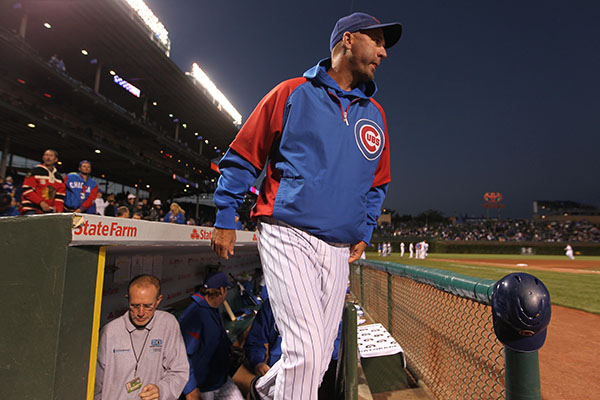
Photo: Chris Sweda / Chicago Tribune
Dale Sveum: Out!
Short-term, unsuccessful managers have as much history with the Chicago Cubs organization as any pile of bricks or patch of ivy. They pre-date Wrigley Field. They pre-date the “lovable losers” mantra. They pre-date the name “Cubs”.
In fact, the trail of ex-managers is the most complete path back to the inception of the Chicago franchise. Two-year guys, three-year guys, failures, and fill-ins will guide you back through World War II, past the Great Depression, into the turn of the century, and drop you off at a time when Rutherford B. Hayes ruled the nation, and a team called the “Dark Blues” competed for World Series.
But, despite all those years, it’s still unusual to encounter a lengthy tenure. Only four managers in 137 years have managed more than 1,000 games for the Chicago Cubs, a feat generally accomplished in six-and-a-half seasons.
The longest tenured manager in the club’s history, Cap Anson, never managed a game in the 1900s. Charlie Grimm, who managed three World Series losses (1932, 1935 and 1945), comes next on the list, followed then by Frank Chance, who ended his run—which included the Cubs’ only World Series titles—in 1912.
In the modern era, there’s only Leo Durocher, who is famous for welcoming Jackie Robinson into the league, managing the “Shot Heard ‘Round the World,” coining the phrase, “Nice guys finish last,” and choking away the Cubs’ 1969 season. Only the last one of those moments occurred during his tenure in Chicago.
The thousand-game mark is not unattainable, nor is it worshipped by baseball gurus for its rarity. It’s only rare in Chicago, where teams constantly hemorrhage and the coach can never stop the bleeding.
Take it from the present day on back. Before Dale Sveum, who managed in 2012 and 2013, Mike Quade served as manager for a little over a season, but was promptly shown the exit when a new front office took over after the 2011 season.
Before Quade was Lou Pinella, who managed 609 games for the team from 2007 to 2010, but quit midseason, two years after wasting the winningest Cubs team since 1945.
Dusty Baker was the man in charge ahead of “Sweet Lou,” as well as the man who took the Cubs as close to the Promised Land as any manager in recent history. But Baker sat in the dugout chewing on a toothpick while Steve Bartman, panic, impending doom, and the Florida Marlins derailed the seemingly destined 2003 team. He was fired three years later, after a collapse in 2004 and two miserable seasons following. He managed 648 games for the Cubs.
Before that was Don Baylor, who missed the playoffs each of his first two seasons and was fired midway through his third, despite Sammy Sosa hitting an ungodly 163 homeruns in those three years.
Then there was Jim Riggleman, whose 793-game tenure included a 90-win season and a playoff berth in 1998. But the team was swept handily by the Atlanta Braves, faltered the next season and Riggleman was fired, like all the rest.
A stream of short-term guys filled the managers role between Riggleman and Durocher, who left in 1972. Tom Trebelhorn, Jim Lefebvre, Jim Essian, Don Zimmer, Gene Michael, Jim Frey, Lee Elia, Joey Amalfitano, Preston Gomez, Herman Franks, Jim Marshall, Whitey Lockman—only Zimmer managed a full three seasons (fired in May of his fourth season).
From there, go back 20 playoff-less seasons that included six more managers and the “College of Coaches”—a management by committee program that included six more managers and doomed the Cubs for five seasons—and, finally, you’ve reached 1945: The last Cubs World Series appearance. Which they lost.
Back even farther, the Cubs experienced an era of success, yet the trend of short-term managers continued. Spattered between two stints of Charlie Grimm, 12 managers had tenures of four years or less between 1913 and 1944. Then four more managers over 14 years, then Cap Anson’s reign, then four more guys, and finally, mercifully, you reach the end—1876.
Dale Sveum was shown the door out of Wrigley for the final time this week, but his exit from the ballpark is also an entrance to a long, storied tradition. Sveum led a miserable team, lost a lot, and was fired as quickly as he’ll be forgotten. Like so many before him, he was just the man for the job.


